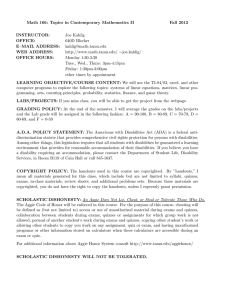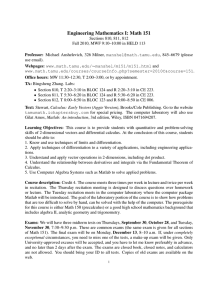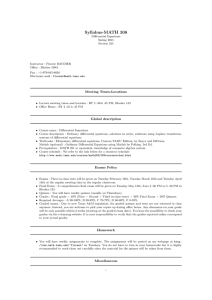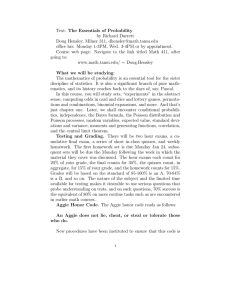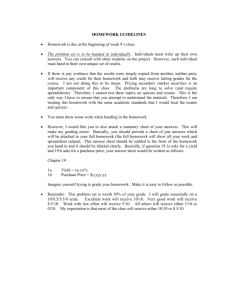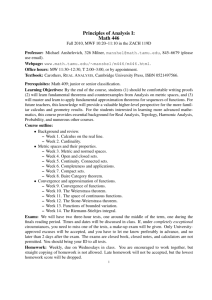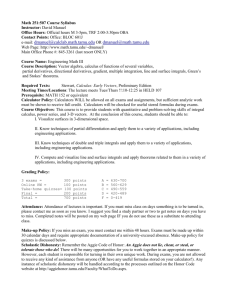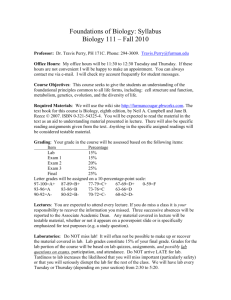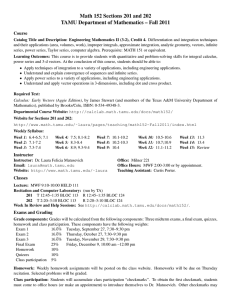Math 151: Calculus I Fall 2007 Joe Kahlig 862–1303
advertisement
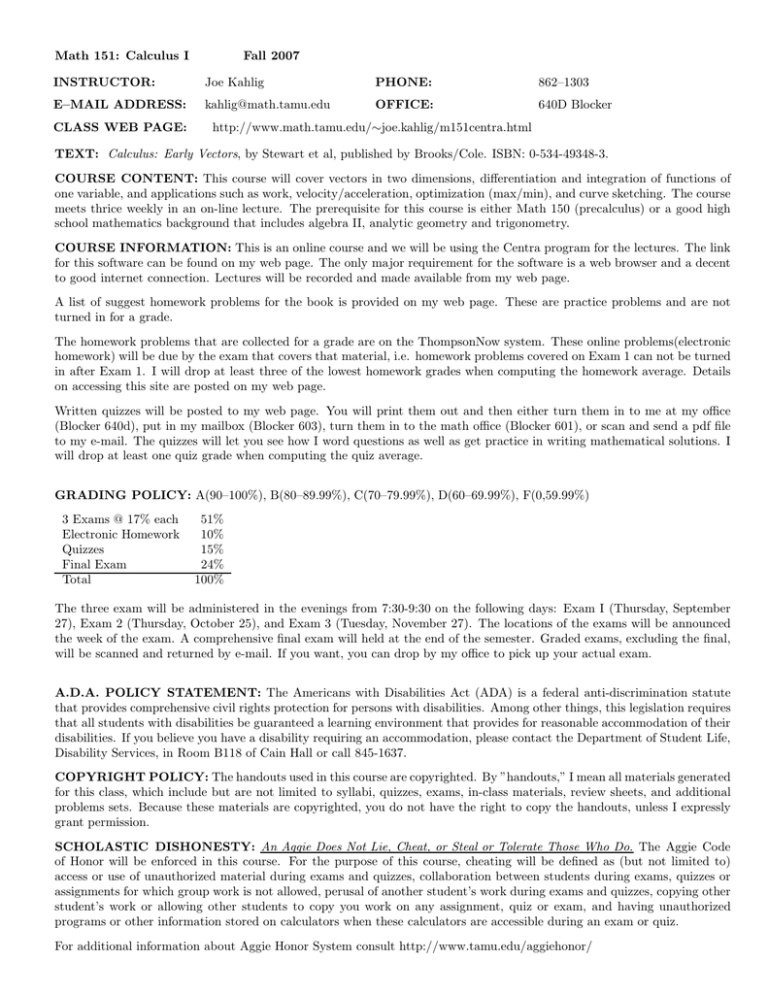
Math 151: Calculus I Fall 2007 INSTRUCTOR: Joe Kahlig PHONE: 862–1303 E–MAIL ADDRESS: kahlig@math.tamu.edu OFFICE: 640D Blocker CLASS WEB PAGE: http://www.math.tamu.edu/∼joe.kahlig/m151centra.html TEXT: Calculus: Early Vectors, by Stewart et al, published by Brooks/Cole. ISBN: 0-534-49348-3. COURSE CONTENT: This course will cover vectors in two dimensions, differentiation and integration of functions of one variable, and applications such as work, velocity/acceleration, optimization (max/min), and curve sketching. The course meets thrice weekly in an on-line lecture. The prerequisite for this course is either Math 150 (precalculus) or a good high school mathematics background that includes algebra II, analytic geometry and trigonometry. COURSE INFORMATION: This is an online course and we will be using the Centra program for the lectures. The link for this software can be found on my web page. The only major requirement for the software is a web browser and a decent to good internet connection. Lectures will be recorded and made available from my web page. A list of suggest homework problems for the book is provided on my web page. These are practice problems and are not turned in for a grade. The homework problems that are collected for a grade are on the ThompsonNow system. These online problems(electronic homework) will be due by the exam that covers that material, i.e. homework problems covered on Exam 1 can not be turned in after Exam 1. I will drop at least three of the lowest homework grades when computing the homework average. Details on accessing this site are posted on my web page. Written quizzes will be posted to my web page. You will print them out and then either turn them in to me at my office (Blocker 640d), put in my mailbox (Blocker 603), turn them in to the math office (Blocker 601), or scan and send a pdf file to my e-mail. The quizzes will let you see how I word questions as well as get practice in writing mathematical solutions. I will drop at least one quiz grade when computing the quiz average. GRADING POLICY: A(90–100%), B(80–89.99%), C(70–79.99%), D(60–69.99%), F(0,59.99%) 3 Exams @ 17% each Electronic Homework Quizzes Final Exam Total 51% 10% 15% 24% 100% The three exam will be administered in the evenings from 7:30-9:30 on the following days: Exam I (Thursday, September 27), Exam 2 (Thursday, October 25), and Exam 3 (Tuesday, November 27). The locations of the exams will be announced the week of the exam. A comprehensive final exam will held at the end of the semester. Graded exams, excluding the final, will be scanned and returned by e-mail. If you want, you can drop by my office to pick up your actual exam. A.D.A. POLICY STATEMENT: The Americans with Disabilities Act (ADA) is a federal anti-discrimination statute that provides comprehensive civil rights protection for persons with disabilities. Among other things, this legislation requires that all students with disabilities be guaranteed a learning environment that provides for reasonable accommodation of their disabilities. If you believe you have a disability requiring an accommodation, please contact the Department of Student Life, Disability Services, in Room B118 of Cain Hall or call 845-1637. COPYRIGHT POLICY: The handouts used in this course are copyrighted. By ”handouts,” I mean all materials generated for this class, which include but are not limited to syllabi, quizzes, exams, in-class materials, review sheets, and additional problems sets. Because these materials are copyrighted, you do not have the right to copy the handouts, unless I expressly grant permission. SCHOLASTIC DISHONESTY: An Aggie Does Not Lie, Cheat, or Steal or Tolerate Those Who Do. The Aggie Code of Honor will be enforced in this course. For the purpose of this course, cheating will be defined as (but not limited to) access or use of unauthorized material during exams and quizzes, collaboration between students during exams, quizzes or assignments for which group work is not allowed, perusal of another student’s work during exams and quizzes, copying other student’s work or allowing other students to copy you work on any assignment, quiz or exam, and having unauthorized programs or other information stored on calculators when these calculators are accessible during an exam or quiz. For additional information about Aggie Honor System consult http://www.tamu.edu/aggiehonor/
